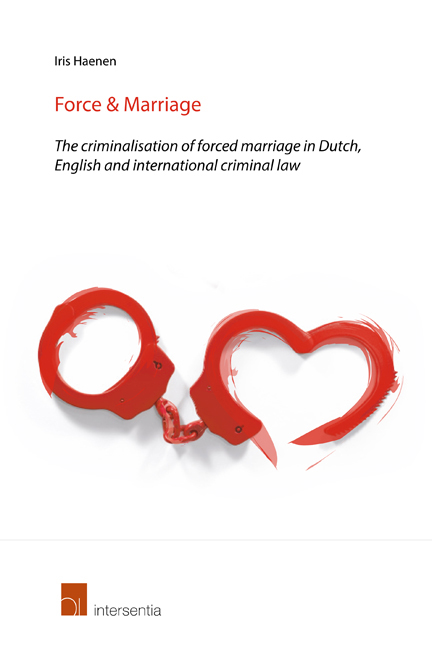 Force & Marriage
Force & Marriage RESEARCH QUESTION
Specific legislation criminalising the act of forcing someone to enter into a marriage is on the rise. During the past decade, many European countries, including Belgium, Norway, Denmark, Germany, Austria and England (as of 2014), have introduced a specific offence of forced marriage in their criminal laws. On the international level, the Sierra Leonean bush wife phenomenon sparked the question of whether forced marriage ought to be classified as a ‘new’ crime against humanity (i.e. as an ‘other inhumane act’), or whether it is caught by existing crimes against humanity such as (sexual) enslavement. This research focused on the question of whether, and, if so, how the practice of forced marriage should be criminalised under Dutch law and international law (with a particular focus on the Rome Statute of the International Criminal Court). In order to answer this question, the phenomenon of forced marriage was first described, after which frameworks – consisting of criminalisation criteria – were created for the levels of national and international law. After analysing current Dutch, English and international criminal law in relation to forced marriage, these criteria were applied to the practice of forced marriage.
THE PRACTICE OF FORCED MARRIAGE
Forced marriages take place all over the world, in times of conflict as well as in times of peace. Universal and regional human rights instruments, such as the UDHR, the ICCPR and the ICESCR, discern the right to marry and the right not to marry without full and free consent. This means that a forced marriage, i.e. a marriage at least one of the partners entered into against their will as a result of some form of coercion that was exerted by another party, constitutes a human rights violation. In many cases, a marriage arranged by parties other than the spouses themselves will be at the basis of a forced marriage. That is to say, an arranged marriage may turn into a forced marriage in those cases where the wishes of the arrangers are not in line with the wishes of the one(s) for whom the arrangements are made, and the former nevertheless force the latter to enter into the marriage.
To save this book to your Kindle, first ensure no-reply@cambridge.org is added to your Approved Personal Document E-mail List under your Personal Document Settings on the Manage Your Content and Devices page of your Amazon account. Then enter the ‘name’ part of your Kindle email address below. Find out more about saving to your Kindle.
Note you can select to save to either the @free.kindle.com or @kindle.com variations. ‘@free.kindle.com’ emails are free but can only be saved to your device when it is connected to wi-fi. ‘@kindle.com’ emails can be delivered even when you are not connected to wi-fi, but note that service fees apply.
Find out more about the Kindle Personal Document Service.
To save content items to your account, please confirm that you agree to abide by our usage policies. If this is the first time you use this feature, you will be asked to authorise Cambridge Core to connect with your account. Find out more about saving content to Dropbox.
To save content items to your account, please confirm that you agree to abide by our usage policies. If this is the first time you use this feature, you will be asked to authorise Cambridge Core to connect with your account. Find out more about saving content to Google Drive.